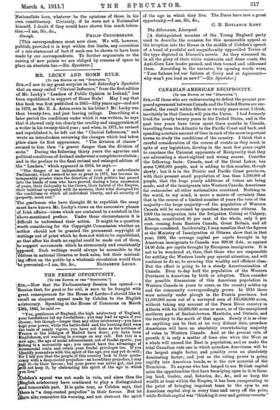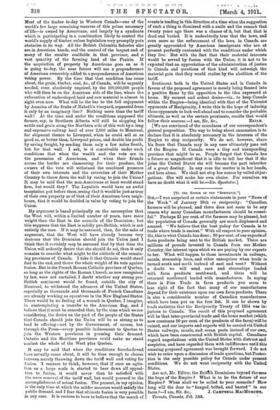CANADIAN-AMERICAN RECIPROCITY.
[To Tar EDITOR OF THE " SPRCTATOZ."1 Sin,—If those who are endeavouring to defeat the present pro- posed agreement between Canada and the United States are suc- cessful, the result within fifteen or twenty years must, I think, inevitably be that Canada will join the Union. I had formerly lived for nearly twenty years in the United States, and in the past two years have twice spent three months in Canada, travelling from the Atlantic to the Pacific Coast and back, and spending a certain amount of time in each of the more important towns to study the conditions of the country. I think that a careful consideration of the course of events as they must, in spite of any legislation, develop in the next few years ought to convince the Unionist opponents of Reciprocity that they are advocating a short-sighted and wrong course. Considet the following facts : Canada, east of the Great Lakes, has some 7,000,000 people, and is adding to this number, though slowly ; but it is in the Prairie and Pacific Coast provinces, with their present small population of less than 1,500,000 of people, that the huge yearly additions of voters are being made; and of the immigrants into Western Canada, Americans far outnumber all other nationalities combined. Nothing in the world, to my mind, is more a matter of certainty than that in the course of a limited number of years the vote of the majority—the large majority—of the population of Western Canada will be exercised by quondam American citizens. In 1909 the immigration into the Irrigation Colony at Calgary. Alberta, constituted 95 per cent. of the whole, only 5 per cent. coming from Eastern Canada, Great Britain, and all Europe combined. Incidentally, I may mention that the figures at the Ministry of Immigration at Ottawa show that in that year, 1909, the average ',capital per capita brought in by American immigrants to Canada was 800.00 dole., as against 14.00 dole. per capita brought by European immigrants. It is not to be wondered at, then, that those who are responsible for settling the Western lands pay special attention, and will continue to do so, to securing this wealthy and efficient class. But the effect is going to be a steady Americanisation of Canada. Even to-day half the population of the Western Provinces is American by birth or adoption. Then consider the possible dimensions of this American population in Western Canada in years to come, as the country settles up and the community correspondingly grows. In 1910 there were actually under plough in the Prairie provinces but 11,000,000 acres out of a surveyed area of 135,000,000 acres, without taking any account of the Peace River country in Alberta with its 50,000,000 acres or more, or of the unexplored northern part of Saskatchewan, Manitoba, and Ontario, and the territory to the north of that again. Surely it is as clear as anything can be that, at no very distant date, quondam Americans will have an absolutely overwhelming majority of votes in Western Canada. And at the present rate of growth it is only a matter of time also when the West as a whole will exceed the East in population, and so make the total Canadian vote one in which quondam Americans will be the largest single factor, and possibly even an absolutely dominating factor; and just as the voting power is going rapidly into American hands, so is the raw material of the Dominion. To anyone who has longed to see British capital seize the opportunities that have been lying open to it in farm- ing land, timber, coal, fisheries, &c., See., and so keep the wealth at least within the Empire, it has been exasperating to the point of bringing impotent tears to the eyes to see American capital step in every time and carry off the prize, while British capital was "thinking it over and getting renorts." Most of the timber to-day in Western Canada—one of the world's few large remaining reserves of this prime necessary of life—is owned by Americans, and largely by a syndicate which is participating in a combination likely to control the world's supply of timber, unless legislation very promptly puts obstacles in its way. All the British Columbia fisheries also are in American hands, and the control of the largest and of many of the smaller coalfields in that province, and a vast quantity of the farming land of the Prairie. If the acquisition of property by Americans goes on as it is going to-day, the near future will see a preponderance of American ownership added to a preponderance of American voting power. By the time that that condition has come about, the grain, timber, coal, Scc., of Canada, will be urgently needed, even absolutely required, by the 100,000,000 people who will then be on the American side of the line, where the exhaustion of undeveloped land and raw material is almost in sight even now. What will be the bar to the full enjoyment by America of the fruits of Naboth's vineyard, separated from it only by an imaginary line Nothing more than the tariff wall ! At the time and under the conditions supposed the farmer, say, in Southern Alberta will still be shipping his cattle and grain along the Northern side of this wall by a long and expensive railway haul of over 2,000 miles to Montreal, for shipment thence to Liverpool, when he could sell at as good as, or better than, Liverpool prices, and double his profit by saving freight, by sending them only a few miles South, but for that wall. I ask, is it conceivable under such conditions that when the wealth and the vote are in the possession of Americans, and when their friends across the border are clamouring for their produce, the owners of the vote will withstand the combined pressure of their own interests and the entreaties of their Mother Country to throw down the wall by voting to join the Union ? It may be said that the non-Americans at least would stand firm, but would they The Loyalists would have an awful temptation put before them, seeing that it would be just as true of their own property as of that of their American-born neigh- bours, that it would be doubled in value by Toting to join the Union.
My argument is based principally on the assumption that the West will, within a limited number of years, have more weight than the East in the councils of the Dominion ; but this supposes that the East is solidly pro-British, which is not entirely the ease. If it may be assumed, then, for the sake of argument, that the West will have already become very desirous that the Dominion should join the Union (and I think that it certainly may be assumed that by that time the Union will ardently desire that she should do so), then it only remains to consider what might be the attitude of the remain- ing provinces of Canada. I take it that Ontario would stand fast to the end, and throw the whole weight of its vote against fusion. But in the French Roman Catholic province of Quebec, so long as the rights of the Roman Church, as now recognised by law, were not curtailed, I doubt whether any strong pro- British sentiment would be found, outside the city of Montreal, to withstand the advances of the United States, especially as thousands and thousands of French Canadians are already working as operatives in the New England States. There would be no feeling of a wrench in Quebec, I imagine, in contemplating a transfer to the American flag, and I believe that it must be conceded that, by the time which we are considering, the desire on the part of the people of the States that Canada should join the Union will be so strong as to lead to offering—not by the Government, of course, but through the Press—every possible inducement to Quebec to join the Western provinces in pressing their demand. Ontario and the Maritime provinces could make no stand aaainst the whole of the West plus Quebec.
It may be said that when the conditions foreshadowed have actually come about, it will be time enough to choose between merely throwing down the tariff wall and voting for fusion. I venture to think, however, that if once an agita- tion on a large scale is started to bear down all opposi- tion to fusion, it would never then be satisfied with the mere removal of the tariff wall, but would proceed to the accomplishment of actual fusion. The present, in my opinion, is the only time at which the milder measure would satisfy the public demand, and I fear that ultimate fusion is very possible in any case. It is curious to have to believe that the march of
events is tending in this direction at a time when the suggestion of such a thing is dismissed with a smile and the remark that twenty years ago there was a chance of it, but that that is dead and buried. It is undoubtedly true that the laws, and even more so the enforcement of the laws, in Canada are greatly appreciated by American immigrants who 'are at present perfectly contented with the conditions under which they live. But with the fact that their material interests would be served by fusion with the Union, it is not to be expscted that an appreciation of the administration of justice in Canada and questions of that kind will outweigh the material gain that they would realise by the abolition of the tariff.
Sentiment both in the United States and in Canada in favour of the proposed agreement is merely being fanned into a positive flame by the opposition to the idea expressed at home. My earnest and ardent desire—viz., to keep Canada within the Empire—being identical with that of the Unionist opponents of Reciprocity, I write this in the hope of inducing those opponents to look well ahead and to consider the probable ultimate, as well as the certain proximate, results that would
follow their success.—I am, Sir, Sze., EXILE.
[We are convinced of the soundness of our correspondent's general proposition. The way to bring about annexation is to declare that it is absolutely necessary in the interests of the Empire to stop reciprocity. We do not, however, share his fears that Canada may in any ease ultimately pass out of the Empire. If Canada were a tiny and unexpanding province that might be so. People forget that Canada has a future so magnificent that it is idle to tell her that if she joins the United States she will become the part inheritor of a great destiny. In any case the matter is in her hands, and hers alone. We shall not stop her course by veiled objur- gations. She will make her own choice. For ourselves we have no doubt what it will be.—En. Spectator.'











































 Previous page
Previous page